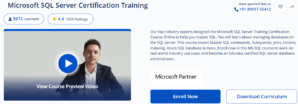What will you learn in Mastering PostgreSQL Databases: From Basics to Advanced Course
Understand PostgreSQL fundamentals including database creation, tables, and data types
Master SQL commands for data retrieval, filtering, joins, subqueries, and aggregations
Perform advanced operations like indexing, views, stored procedures, and triggers
Optimize query performance with EXPLAIN plans and indexing strategies
Manage user roles, privileges, and access control in PostgreSQL
Apply skills to real-world database design, normalization, and performance tuning
Program Overview
Module 1: Introduction to PostgreSQL
⏳ 45 minutes
Topics: PostgreSQL overview, installation, connecting via
psql, database setupHands-on: Install PostgreSQL, create and connect to your first database
Module 2: Data Types & Table Creation
⏳ 1 hour
Topics: Numeric, text, boolean, date/time types; constraints; primary/foreign keys
Hands-on: Create tables with constraints and define column types appropriately
Module 3: Basic SQL Queries
⏳ 1.5 hours
Topics:
SELECT,WHERE,ORDER BY,LIMIT,OFFSETHands-on: Retrieve and filter data with multiple criteria
Module 4: Joins & Subqueries
⏳ 2 hours
Topics: INNER, LEFT, RIGHT, FULL joins; correlated and nested subqueries
Hands-on: Combine tables and write subqueries for complex filters
Module 5: Aggregation & Grouping
⏳ 1.5 hours
Topics:
GROUP BY,HAVING, aggregate functions (SUM,AVG,COUNT)Hands-on: Generate reports from grouped data using conditions
Module 6: Views, Indexing & Performance
⏳ 2 hours
Topics: Creating views, types of indexes,
EXPLAIN, performance tuningHands-on: Create views and analyze queries using index strategies
Module 7: Stored Procedures & Triggers
⏳ 1.5 hours
Topics: Writing functions, stored procedures, defining and firing triggers
Hands-on: Automate business logic using PL/pgSQL procedures
Module 8: Access Control & Roles
⏳ 1 hour
Topics: Creating users, assigning roles, GRANT/REVOKE permissions
Hands-on: Set up role-based access controls in a shared database
Module 9: Real-World Case Studies
⏳ 2 hours
Topics: E-commerce schema design, normalization, query optimization
Hands-on: Build a sample e-commerce database with real-world constraints
Get certificate
Job Outlook
PostgreSQL is a top choice for startups, fintech, and SaaS platforms needing robust open-source databases
PostgreSQL expertise is in high demand for roles like Database Administrator, Backend Developer, and Data Engineer
Salaries range from $90,000 to $140,000+ depending on role and region
Strong PostgreSQL skills are essential in analytics, reporting, and cloud-native app development
Specification: Mastering PostgreSQL Databases: From Basics to Advanced Course
|
FAQs
- Basic understanding of data structures or Excel tables is beneficial but not mandatory.
- Familiarity with SQL can help you learn faster but is not required.
- The course starts with fundamental concepts for beginners.
- Knowledge of programming is useful but not essential.
- Even non-technical learners can grasp PostgreSQL concepts with practice.
- Database Administrator, Data Analyst, and Backend Developer roles are common opportunities.
- PostgreSQL is widely used in finance, healthcare, e-commerce, and tech startups.
- Skills are valuable for cloud database management and DevOps roles.
- Freelance database projects and consulting opportunities are available.
- Expertise in PostgreSQL enhances resumes for data-intensive roles.
- Includes exercises on creating, querying, and managing databases.
- Teaches advanced topics like indexing, transactions, and performance tuning.
- Provides real-world scenarios for database optimization and backup.
- Students learn to design relational databases for applications.
- Helps build a portfolio of projects for job interviews or professional growth.
- Certified or skilled PostgreSQL professionals are in demand for technical roles.
- Employers value proven database expertise, which can lead to higher salaries.
- Advanced database management skills increase eligibility for senior roles.
- Freelance or consultancy opportunities often pay well for database projects.
- Combining PostgreSQL skills with cloud or programming knowledge further boosts earning potential.
- Some technical familiarity is helpful but not strictly necessary.
- Learning-by-doing exercises make database concepts easier to grasp.
- Focus is on practical usage, queries, and management rather than theory-heavy topics.
- Helps professionals in data-driven roles understand, analyze, and manage databases.
- Supplementary resources and guided exercises make it approachable for motivated learners.





